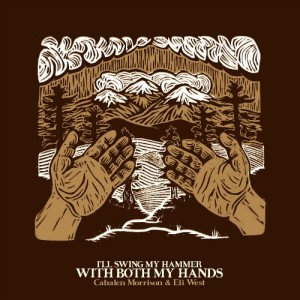 Acoustic Americana just doesn’t get much better than Cahalen Morrison & Eli West’s I’ll Swing My Hammer With Both My Hands. This is the second release by this duo who have quickly become very popular on the theater and festival circuit. Morrison is a road-tested New Mexico native and a journeyman player of numerous musical instruments, especially those with strings. He’s been based in Seattle for a few years, and it’s there that he joined up with West, himself a formidable string player and singer. Both are versed in a whole range of music from jazz to rock, and those influences subtly influence their playing and singing.
Acoustic Americana just doesn’t get much better than Cahalen Morrison & Eli West’s I’ll Swing My Hammer With Both My Hands. This is the second release by this duo who have quickly become very popular on the theater and festival circuit. Morrison is a road-tested New Mexico native and a journeyman player of numerous musical instruments, especially those with strings. He’s been based in Seattle for a few years, and it’s there that he joined up with West, himself a formidable string player and singer. Both are versed in a whole range of music from jazz to rock, and those influences subtly influence their playing and singing.
On this album, West plays guitar and bouzouki and Morrison plays banjo, mandolin, bouzouki and Dobro. Ryan Drickey, who regularly plays fiddle with them, is also present, as are Brittany Haas on fiddle, Erin Youngberg and Tim O’Brien, who produced and plays mandolin and bouzouki. Morrison’s and West’s voices complement each other as well as any two voices currently singing this kind of music. Both are roughly tenor in range but with quite different timbres. West’s is fairly straightforward and clean while Morrison’s is a quirky voice, part Vic Chesnutt, part Steve Weber. Both easily carry lead duties and both sing fine high-lonesome harmonies.
For a taste of the deceptive simplicity of their music, just listen to the opening track. West’s guitar harmony line reminds me of the way A.P. Carter sang on the Carter Family records, his baritone harmonies coming and going seemingly at random behind the soprano and alto lines of Sarah and Maybelle. The lyrics of this song are impressionistic in the extreme, like so many old-time mountain songs, their symbolism deep and mysterious – but nestled deep inside is this line: “I can’t wink without dreaming about you.” Once you have that key, then the whole song opens up.
Cahalen wrote most of the songs on this collection of 13 (plus that “Fiddlehead Fern” reprise), and his writing is most often like that – subtle and roundabout, even on songs that seem straightforward like the second, “Livin’ In America,” whose first line gives the album its title. It’s a full-band bluegrass song with mandolin, guitar, fiddle, bass, and it’s a love song that also paints a vivid picture of both working-class life and the life of a musician. “Pocket Full Of Dust,” on which West sings lead, is such an upbeat song with such an uplifting bridge verse that it takes a while to figure out that it’s a sad song of unrequited love. And the stirring ballad “Down In The Lonesome Draw” at first seems a patriotic ballad of American restlessness, but it also contains images of environmental damage, the hard lot of working people, and the old slave-vs-free debate that in many ways continues to define the American heartland.
If Cahalen’s “Off The Chama” was a three-part instrumental built on the subtly stirring intro of this song, with guitar, mandolin and bouzouki twining around each other, it would be a fine thing. The actual song is something different but just as good, a ballad worthy of Tom Russell, with lots of apparently autobiographical detail tossed in about the singer’s journey from New Mexico to Washington state and his steadfast love for a young woman – or is it his muse? There are clues but no answers in the chorus:
She’s bright as the moon-glow and quick as a cat,
her eyes like a quarry of stone,
And under her bosom was a true beating heart,
mine rattled my breastbone as a prisoner of war.
And I just love “James Is Out,” a perky duet with Cahalen singing lead and playing banjo, Eli on harmony and guitar. This song that’s mostly about a mule is a playful blend of contemporary folk and ancient old-time, with lots of authentic and humorous imagery of rural life: Momma’s woolen overcoat and her biscuits, Daddy bending barrel staves with his hat perched on his noggin, and James getting into something out in the pasture. Here’s the duo performing the song at Pickathon in 2013.
The choices of cover songs are excellent, from Pete Goble and Leroy Drumm’s love song “Natural Thing To Do,” to the Louvin Brothers’ “Lorene” to the traditional old-time gospel “Going To Live In Green Pastures” and Alice Gerrard’s lovely, evocative “Voices of Evening.”
The CD is packaged nicely with a beautiful woodcut on the cover, a sturdy CD sleeve and an insert with the lyrics printed in agate type that you may need a monocle to read. On the CD pocket is printed a blurb from none other than Bruce Molsky, one of the most highly respected musicians in old-time music today. I cannot improve on what Molsky says, so I’ll leave it at that: “Eli and Cahalen are master musical craftsmen, and this is a creative jewel.”
You can get this (and Morrison and West’s first album) at CDBaby.
self-released, 2014
